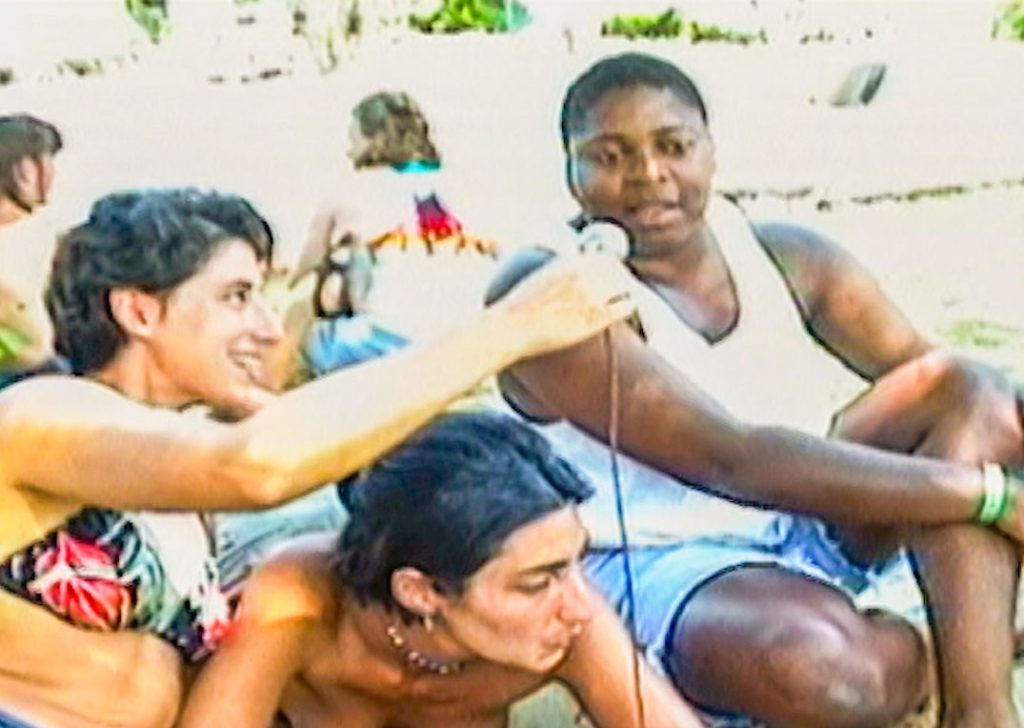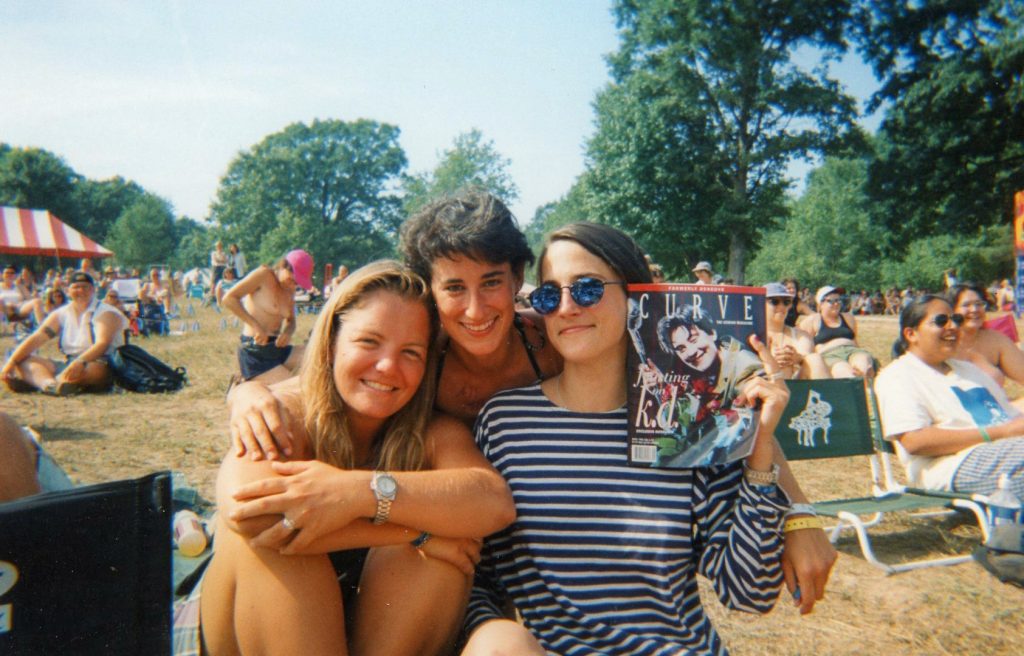Ahead Of The Curve Premieres at the Frameline Festival Drive-In Style!
From its start in 1990, Curve magazine was a visionary and unapologetic celebration of lesbian life from cover to cover. Facing the magazine’s possible demise in 2019, director Jen Rainin and Curve founder Franco Stevens explore questions of lesbian visibility, legacy, intersectionality and current day issues through interviews with contemporary LGBTQ+ tastemakers and activists, “celesbians” including Melissa Etheridge, Jewelle Gomez, Denice Frohman, Kate Kendell, and Lea DeLaria, along with rich archival footage recounting the formation of a lesbian cultural institution.
The world premiere of this important movie will be a Special Screening this Saturday, June 27th, 2020 West Wind Solano Drive-In Theater, 1611 Solano Way, Concord, CA. Tickets are available here, and if you plan to go, you are encouraged to decorate your car and be part of this unique premiere with pride. In addition to the drive-in screening, audiences can also view AHEAD OF THE CURVE online as part of the virtual Frameline44 Pride Showcase here.
Ahead of this weekend’s premiere, I had the wonderful opportunity to talk to the creators, Directer and Co-Producer Jen Rainin & Co-Directer and Producer Rivkah Beth Medow.
Richard Jones: What was catalyst for creating a movie, as opposed to any other way of chronicling the history of the magazine?
Jen Rainin: – It was really Franco’s story. When I married Franco, I knew she had started Curve but I didn’t know the whole history. Over the first years of our marriage, she would drop little nuggets in my lap about cashing out 12 credit cards in one day and betting everything at the racetrack to fund the magazine, or going to loan sharks to make payroll, or being sued by Catherine Deneuve. I realized this was a fantastic story that would make a terrific narrative film, so I set about writing a screenplay. But as I researched, I quickly realized how little of queer women’s history has been documented and saw the importance of documenting this piece of lesbian history accurately. So I began filming the historical story.
Rivkah Beth Medow: – When I joined the film Jen had already been thinking deeply about this story and done a ton of pre-interviews with all the women who helped start Curve. The Trump administration had recently been voted into office and begun dismantling the progress made over the past 30 years which led to several conversations about why this story needed to be told now. We talked about our core values around community, how Franco built community to meet her own needs, and in doing so met the needs of her community; and how this story could be critical to building community power that continues to cultivate extraordinary change.
RJ: What has been easy or hard during the journey of creating the movie?
RBM: As you probably expect the most intense challenges have come in the last few months in the run-up to our World Premiere. We’d been invited to premiere at the storied Castro Theater as a spotlight film with Frameline which felt like an ideal way to bring the film into the world. Then PANDEMIC! So we came up with a pretty sweet Plan B for the Drive-In where we’d invite people to decorate their cars for Pride and throw a big socially distanced party. After Ahmaud Arbery, Breonna Taylor, and George Floyd’s murders catalysed the long-overdue racial justice reckoning we’re in now we did some deep soul searching to ask if this was the right time for our film. We spoke with our advisors and friends about celebrating our film in this moment while recognizing and honoring the time we’re living in, and everyone agreed that telling queer stories is in itself an act of resistance.
JR: Sharing the story of a visionary and unapologetic celebration of lesbian life and illuminating the call for radical intersectionality in the LGBTQ+ movement is an act of resistance. Our movement was forged in joy and struggle – as queer people, our very existence is resistance – so we’re celebrating Pride in community and using our joy as a powerful and nourishing tool to fuel our fight.
RBM: We made this film in a deeply intersectional way both in front of and behind the camera, with an extraordinarily talented, all female-identified cast and crew. This is the right time for this film and rich, engaged, intersectional positive change with our LGBTQ+ community.
There were of course challenges around finding good gluten-free craft service in Florida or holding crew feelings around the Kavanaugh appointment too…really though, we had committed to working with an all female-identified crew which meant booking crews earlier and occasionally having to fly them to places where we couldn’t find local female crew. It also meant really investing in mentoring younger women and taking a genuine interest in helping them along their own path as filmmakers, which I don’t think of as a challenge so much as just the way all sets should be but usually weren’t in my experience as a younger filmmaker.
Some of the biggest challenges in the edit were around providing a thorough, entertaining, and nuanced history of Curve while expanding the space in the film to tell current, pressing stories about queer and lesbian women so that more women could see themselves reflected in the story. Lesbians and queer women are not a monolithic community, and we wanted to listen to and amplify community voices and help grow the grassroots power that are core parts of both Franco’s work and ours as filmmakers. Fortunately we have an Impact Campaign around the film that will help us engage in a collaborative process with partners, community, leaders, and organizations so the film can join conversations that help increase power for queer and lesbian women everywhere.

RJ: What did you perhaps discover that amazed you on this journey from concept to the premiere?
JR – In the middle of filming, Franco got a call from the current owner of Curve letting her know that the magazine was in trouble. It sent Franco down a new path to learn what today’s queer women want and need. That not only deepened my understanding and respect for Franco, it really opened my eyes to the activism happening today, and awakened a desire to carry on the work that Franco started, but through a philanthropic structure. As a result, Franco and I are now committed to building The Curve Foundation to lift up queer women’s voices and tell their stories.
The other big awakening for both Franco and me during the filming process was realizing that since we got marriage equality, most folks assume that we have equal rights across the board. WE DO NOT. The anti-LGBTQ+ movement has never let up. Although the Supreme Court has just ruled on employment protections, in more than half the country you can still be evicted, or denied public services just for being gay. And in the last two years, more than 350 anti-LGBTQ+ bills have been introduced at the state level across the nation, and there are more in the pipeline.
RJ: Who is the movie aimed at? What do you hope the audience will get out of watching?
JR & RBM – We want people to walk away from the film feeling indignant about the struggle lesbians have faced over the years, angry that we are under attack today, connected to the community, heartened by the strength and size of the community, and inspired to support the community in truly intersectional ways. We want the LGBTQ+ community to stop working in a siloed way and to embrace this intersectional work on a core level. We want them to be curious enough about the Curve Foundation to look it up and engage with it. We want them to feel empowered and excited by the realization that in meeting your own needs, with the support of your community you can make extraordinary change. We also want straight audiences to recognize the ways in which for years lesbians and queer women have been marginalized and endangered and feel compelled to ally now and in the future.
RJ: What’s the future for the movie? What do you hope its legacy will be?
JR: The film is infused with the values that called Franco to start, and to fight for her magazine. Our core values of community, visibility, and justice shape our work. It was important for us to lift up and celebrate the diversity of queer women just as Franco did, and to bring different generations together to continue the fight for our rights.
RBM: Like Kim Katrin says in our film, we believe in “being the authors of our own experiences”. We believe that the way we tell stories is as meaningful as the actual stories we tell, so telling this story and following Franco’s model around inclusivity offered a huge opportunity for us to contribute to an even more expansive and intersectional vision of the community.
JR – We want Queer women to know our history, Franco’s story, our rights, and that despite marriage and the Supreme’s recent decision on employment rights doesn’t mean we have equal protections even now. We want to build the Curve Foundation based on input and ideas from what our community says it wants and needs now. We see the film as a way to bridge the work of an older generation with the work our younger sisters are doing today. Our Impact Campaign around the film centers on a series of transformational, intersectional community conversations called Beyond the Rainbow: Queer Womanhood and the power of our Diverse Voices. We believe in a world where LGBTQ+ women have agency and respect to be the authors of our own stories and to have our truths reflected back to us in the media we receive.






